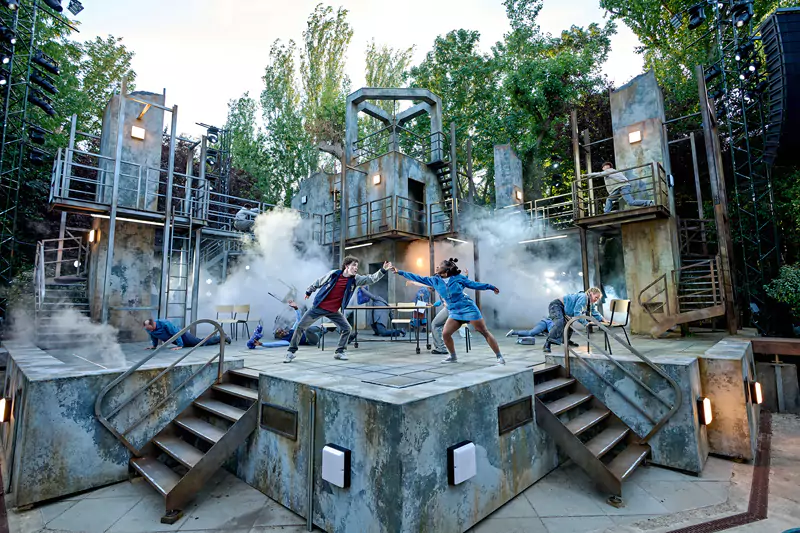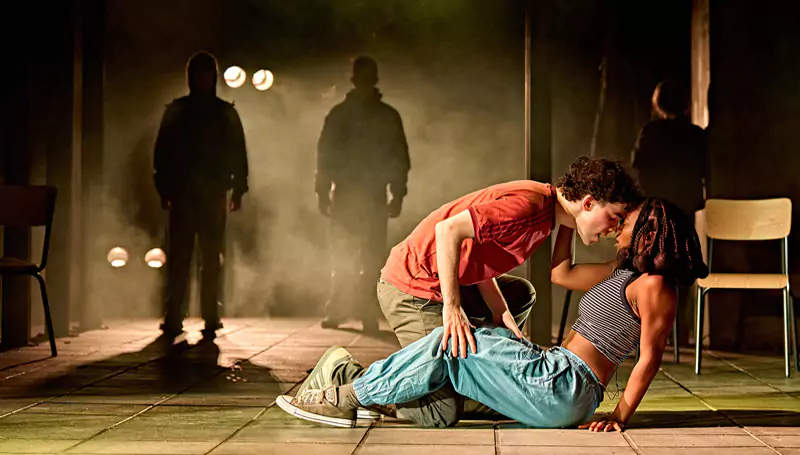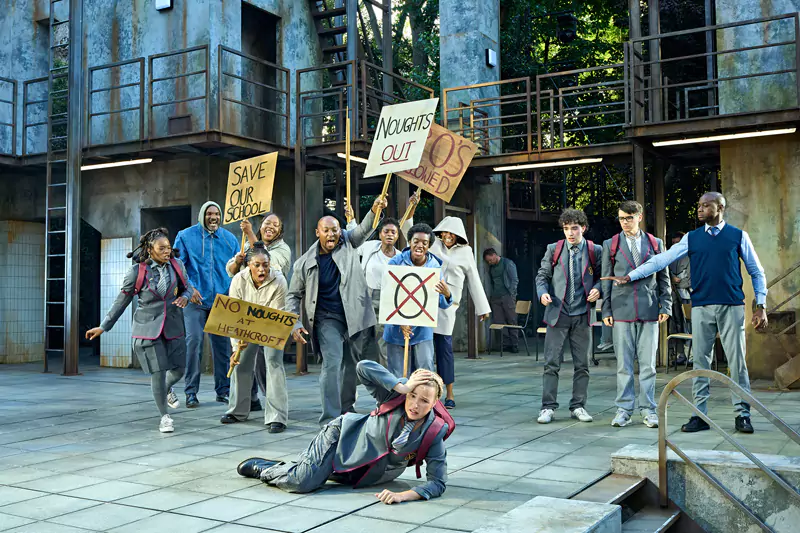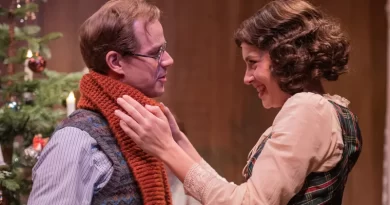“Noughts & Crosses” at Regent’s Park Open Air Theatre
Neil Dowden in North London
10 July 2025
Malorie Blackman’s bestselling young adult novel Noughts & Crosses (2001) – the first of a series – was originally adapted for the stage by Dominic Cooke for the RSC in 2007. Now Regent’s Park Open Air Theatre has thrillingly revived this dramatization of Blackman’s speculative fiction. It’s an alternative history imagining a 21st-century Britain segregated into ‘Noughts’ (whites) and ‘Crosses’ (blacks), but in this thought experiment about the inequalities of race and class the latter group are dominant. By flipping the usual status quo Blackman sheds new light on what is it is like to live in a society where skin colour prejudices attitudes.

Photo credit: Manuel Harlan.
The story focuses on the love between a black girl, Sephy (Persephone) Hadley, and a white boy, Callum McGregor, who have been friends since young children but become lovers in their teens despite the colour bar. They have grown up together because Callum’s mum used to be housekeeper for the wealthy Hadleys until she was sacked by Sephy’s mother, and now they have to keep their friendship secret. Although Callum wins a scholarship to Sephy’s exclusive, black high school Heathcroft, this causes more problems as they become embroiled in inter-racial clashes. But the situation gets much worse when the terrorist/freedom-fighting group Liberation Militia blows up a busy shopping centre.
There’s a touching vulnerability in Sephy and Callum’s intimate relationship, especially as they both come from dysfunctional families. Sephy may be privileged economically but her distant deputy prime minister father Kamal is having an affair while her mother Jasmine is a neglectful alcoholic and she quarrels with her older sister Minerva (whom she calls “Minnie” to annoy her). Callum’s family are short of money as his now unemployed mum Meggie tries to keep the peace: Callum’s traumatized sister Lynette (who has deluded herself into thinking she is a Cross after she and her former black boyfriend were violently attacked) is bullied by his older brother Jude, who with his dad Ryan become involved with the Liberation Militia.
Photo credit: Manuel Harlan.
Their difficult domestic backgrounds seem to bind Sephy and Callum together more strongly, as they discover a burgeoning sexuality. But they (literally) get caught in the crossfire as the uprising escalates, and Callum is forced to choose between his loyalty to his family/tribe and his love for Sephy. There is an element of the transgressive romance of Romeo and Juliet (including a Nurse-like go-between and crucial messages going astray). But although Noughts & Crosses also features an innocent young couple who tragically become victims of an adult conflict, in Shakespeare’s play it is a feud between their families “alike in dignity” whilst here there is a two-tier society.
As well as being inspired by her own personal experiences and institutionalized racism in this country (including the Stephen Lawrence murder and subsequent scandalous police conduct), Blackman’s writing was no doubt influenced by the recent historic periods of apartheid in South Africa and segregation-era Southern USA. But because of her subverting of racial identities, the essential inhumanity of these power structures is exposed, so it could apply to any polarized scenario such as Protestant/Catholic sectarianism in Northern Ireland, or even the Israeli/Palestinian conflict in the Middle East. This YA story deals with some very dark issues, though its powerful moral message is clear (if at times a bit simplistic).
In fact, the novel is more subtle with its distinction between pale-skinned and dark-skinned people compared with the play which is necessarily embodied and more schematic. It is also written in alternating first-person narrations of Sephy and Callum, revealing their different perspectives, which Cooke has had to change though they do sometimes directly address the audience. The play concentrates on the plight of Sephy and Callum and their respective families rather than depicting in any detail the larger social environment, although occasionally a newsreader comes on stage to report on the political situation.
Tinuke Craig’s production is dynamic and engaging, but it needs more edginess to really bite. The large cast is on stage most of the time, lurking in the background when not involved in a scene, but if this is intended to suggest social pressure it lacks impact. The love scenes between Sephy and Callum are sensitively done, while the bombing is well choreographed (movement and intimacy director Ingrid Mackinnon). It’s unclear why Colin Richmond’s set of discoloured walls, stark gangways, and rusty ladders evokes industrial decay (presumably a general sense of urban dystopia), but strong use is made of a tower for public hangings.
There is persuasive chemistry between Corinna Brown’s appealingly feisty Sephy and Noah Valentine (making his professional stage debut) as the sensitive, conflicted Callum, so that we are rooting for their future together. Amanda Bright is amusing as the well-heeled shopaholic but Chablis-addicted Jasmine, Habib Nasib Nader plays the smooth politician Kamal interested only in public appearances, and Jessica Layde is the sharp-tongued, unhappy Minerva. Kate Kordel makes a warmly sympathetic Meggie, Richard Riddell is the protective but desperate Ryan, Alec Boaden the angry extremist Jude, and Chanel Waddock plays the suicidal Lynette who can no longer cope with such a disturbing reality.










